- Australia’s Clean Energy Council (CEC) says in a newly published paper that large-scale battery energy storage has become the best way to spread energy generated by solar and wind throughout any day, and to instantly respond to peak energy needs in the National Electricity Market (NEM) for long and short durations.
The paper compares the levelized cost of energy delivered by a new 250 MW gas peaker plant with 250 MW four-hour and two-hour grid-scale batteries. It finds that overall – when various costs are calculated – that the batteries are 17% (two-hour) and 30% (four-hour) cheaper.
Improvements in battery-operating technology mean storage now outperforms gas-fired peaking plants on speed and reliability of response, which was the basis of gas technology’s biggest claim to a place in the future renewables-based electricity system.
“Batteries can ramp up quickly, have zero start-up time and provide a better frequency response,” said CEC Chief Executive Kane Thornton.
Link to full paper HERE
Author: Natalie Filatoff
This article was originally published in pv magazine Australia and is republished with permission.















